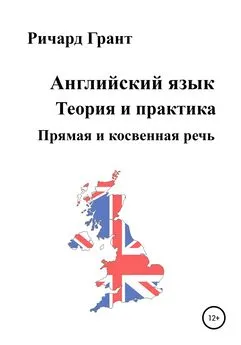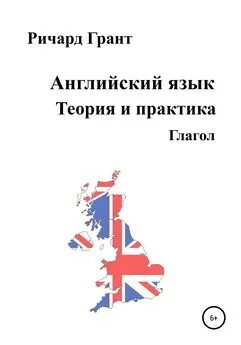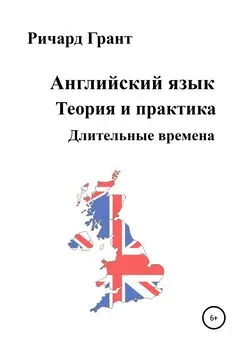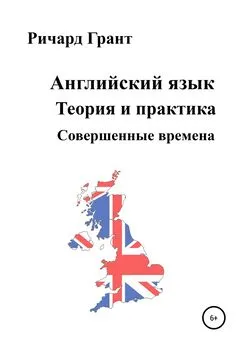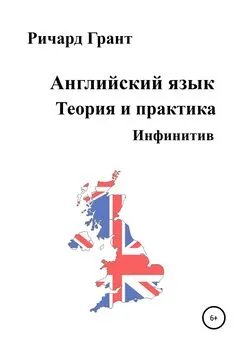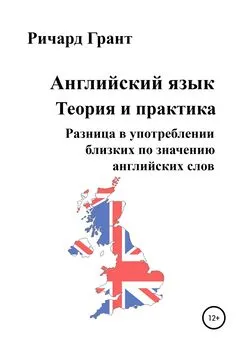Ричард Грант - Английский язык. Теория и практика. Прямая и косвенная речь
- Название:Английский язык. Теория и практика. Прямая и косвенная речь
- Автор:
- Жанр:
- Издательство:неизвестно
- Год:2021
- ISBN:978-5-532-95199-0
- Рейтинг:
- Избранное:Добавить в избранное
-
Отзывы:
-
Ваша оценка:
Ричард Грант - Английский язык. Теория и практика. Прямая и косвенная речь краткое содержание
Освоив теоретический материал, представленный в данной серии и выполнив более 600 упражнений для самоконтроля, Ваш словарный запас будет состоять из более, чем 6 000 английских слов и выражений, что позволит Вам успешно сдать такие международные экзамены по английскому языку, как TOEFL (Test of English as a Foreign Language), IELTS (International English Language Testing System) и другие.
Английский язык. Теория и практика. Прямая и косвенная речь - читать онлайн бесплатно ознакомительный отрывок
Интервал:
Закладка:
prove – доказывать
Direct speech: “See, the system works.” – « Смотри , система работает .»
Indirect speech: He proved that the system worked. – Он доказал , что система работала .
state – утверждать
Direct speech: “I have never seen the young man before.” – « Я никогда не видел этого юноши раньше .»
Indirect speech: The witness stated that she had never seen the young man before. – Свидетель утверждал , что никогда раньше не видел того юноши .
promise – обещать
Direct speech: “I will be back no later than eight o’clock.” – « Я вернусь не позже 8 часов .»
Indirect speech: Dad promised that he would be back no later than eight o’clock. – Папа пообещал вернуться не позже 8 часов .
suggest – предлагать
Direct speech: “Shall we spend the evening together?” – « Мы проведем вместе вечер ?»
Indirect speech: He suggested that they spent the evening together. – Он предложил провести вечер вместе .
assert – утверждать
Direct speech: “Nuclear power is a safe and non-polluting kind of energy.” – « Ядерная энергия безопасна и не приводит к загрязнениям .»
Indirect speech: The scientists asserted that nuclear power is a safe and non-polluting kind of energy. – Ученые утверждали , что ядерная энергия безопасна и не приводит к загрязнениям .
contend – заявлять
Direct speech: “The Earth may be much younger than previously thought.” – « Земля может быть гораздо моложе , чем думали раньше .»
Indirect speech: Some astronomers contend that the Earth may be much younger than previously thought. – Некоторые астрономы заявили , что Земля может быть гораздо моложе , чем думали раньше .
Упражнения
Запомните:
this → that
here → there
today → that day
tomorrow → the next day
Упражнение 1
Передайте следующие повелительные предложения в косвенной речи.
1. “Explain to me how to solve this problem,” my friend said to me. 2. The teacher said to me, “Hand this note to your parents, please.” 3. The doctor said to Nick, “Open your mouth and show me your tongue.” 4. Oleg said to his sister, “Put the letter in an envelope and give it to Kate.” 5. “Don’t be afraid of my dog,” said the man to Kate. 6. “Please help me with this work, Henry,” said Robert. 7. “Take this book and read it,” said the librarian to the boy. 8. “Please bring me some fish soup,” he said to the waitress. 9. The doctor said to Pete, “Don’t go for a walk today.” 10. “Don’t worry over such a small thing,” she said to me. 11. “Don’t eat too much ice cream,” Nick’s mother said to him. 12. “Please don’t mention it to anybody,” Mary said to her friend. 13. “Go home,” the teacher said to us. 14. “Promise to come and see me,” said Jane to Alice.
Упражнение 2
Передайте следующие повелительные предложения в косвенной речи.
1. “Buy some meat in the shop,” my mother said to me. 2. Не said to us, “Come here tomorrow.” 3. “Sit down at the table and do your homework,” my mother said to me. 4. I said to Mike, “Send me a telegram as soon as you arrive.” 5. “Don’t forget to clean your teeth,” said granny to Helen. 6. Father said to me, “Don’t stay there long.” 7. “Don’t sit up late,” said the doctor to Mary. 8. Peter said to them, “Don’t leave the room until I come back.” 9. “Take my luggage to Room 145,” he said to the porter. 10. He said to me, “Ring me up tomorrow.” 11. “Bring me a cup of black coffee,” she said to the waiter. 12. “Don’t be late for dinner,” mother said to us. 13. Jane said to us, “Please tell me all you know about it.” 14. She said to Nick, “Please don’t say anything about it to your sister.”
Запомните:
last → previous, before
these → those
now → then
yesterday → the day before
next → the following
now → at once
ago → before
Упражнение 3
Передайте следующие повествовательные предложения в косвенной речи.
1. Oleg said, “My room is on the second floor.” 2. The woman said to her son, “I am glad I am here.” 3. Masha said, “I usually spend my holidays in the south.” 4. The mother said, “The children are in the nursery, doctor.” 5. “When your turn comes, listen very carefully to what the doctor tells you, ”I said to my grandmother. 6. He said, “I am sure she will ring me up when she is back in Toronto.” 7. Mike said, “We have bought these books today.” 8. She said, “I spent my holidays in the Crimea last year.” 9. “I have no time for lunch today,” said the boy to his mother. 10. “If you are in a hurry, we will do only the first experiment,” the laboratory assistant said to me. 11. Misha said, “I saw them at my parents’ house last year.” 12. She said to me, “Now I can read your translation.” 13. Boris said, “I go to the south every year.” 14. “You speak English very well,” the woman said to me. 15. “I won’t start anything new until I have finished this novel,” said the writer to the correspondent.
Упражнение 4
Передайте следующие повествовательные предложения в косвенной речи.
1. He said, “I haven’t seen my cousin today.” 2. “This man spoke to me on the road,” said the woman. 3. He said, “I am going to a ski resort tomorrow.” 4. My brother said to me, “I am going to become a doctor.” 5. “When I get a job, I’ll buy you a warm coat,” said the boy’s father. 6. “I don’t go to this shop very often,” she said. 7. “I can’t explain this rule to you,” my classmate said to me. 8. Ann said to us, “They haven’t come yet.” 9. My uncle said to us, “I buy several newspapers every day.” 10. “If you spill the milk, there won’t be any for the cat,” my mother said to me. 11. Tom said, “I have already had breakfast, so I am not hungry.” 12. The teacher said to the class, “We will discuss this subject tomorrow.” 13. She said to us, “They arrived in Toronto yesterday.” 14. The teacher said to the pupils, “Next year we will have six hours of English a week.” 15. “When you come to see me on Sunday, I will show you my new dress,” she said to me.
Упражнение 5
Передайте следующие повествовательные предложения в косвенной речи.
1. He said, “I have just received a letter from my uncle.” 2. Our teacher said, “Thackeray’s novels are very interesting.” 3. I said, “I have been in London for a fortnight’s holiday. My friends in London sometimes invite me to spend my leisure time with them.” 4. He said to me, “I want to see you today.” 5. “If Mary arrives before seven, bring her to our house for the evening,” said Jane to Henry. 6. “I am going to the theatre tonight,” he said to me. 7. She said, “You will read this book in the 9th form.” 8. Nick said, “I have never been to London. I think I will go there next year.” 9. She said, “I am free tonight”. 10. “Don’t wait until I come. As soon as you finish the exercises, begin playing volleyball,” said the PT teacher to the pupils. 11. Mike said, “I spoke to Mr. Brown this morning.” 12. Nellie said, “I read Jane Eyre last year.” 13. He said, “I will not stay with my friends too long.” 14. Mother said to me, “I feel bad today.” 15. “As soon as Robert appears, ask him where he put the dictionary,” said Mary to her mother.
Упражнение 6
Передайте следующие повествовательные предложения в косвенной речи.
1. He said to her, “I will do it today if I have time.” 2. “My friend lives in Toronto,” said Alec. 3. He said to me, “They are staying at the Grand Hotel Europe.” 4. The pupil said to the teacher, “I can do my homework after dinner.” 5. I said to them, “I can give you my uncle’s address.” 6. “You have not done your work well,” the teacher said to me. 7. He said, “They are leaving next Monday.” 8. The teacher said to Jack, “You work hard, I know. You are a good boy.” 9. The poor man said to the rich man, “My horse is wild. It can kill your horse.” 10. The clerk said to them, “You can leave the key with the maid upstairs.” 11. The old man said to the girl, “You can sing perfectly well. I think you will be a famous singer.” 12. The rich man said to the judge, “This man’s horse has killed my horse.” 13. My sister said to me, “You look very well, much better than you looked yesterday. I think you have recovered after your illness.” 14. “You are an excellent cook. Everything is so tasty,” my guest said to me. 15. The student said, “I can’t answer this question. I don’t understand it.”
Упражнение 7
Передайте следующие повествовательные предложения в косвенной речи. Употребляйте любое существительное или местоимение в роли подлежащего главного предложения.
1. I will come as soon as I am ready. 2. There will be an interesting lecture at our school tomorrow. One of our teachers will speak about Charles Dickens. 3. You will know that I have gone to the concert if I am not at home by eight. 4. Last year I spent my summer vacation in the Caucasus. 5. I’ll come to the Philharmonic with you if you get the tickets. 6. I came to live in this town several years ago. 7. Five years ago there were no people living here at all. 8. I’ll be reading you a story until it is time to go to bed. 9. I will go skiing on Sunday if I have time. 10. I have read all about it in today’s newspaper. 11. They finished building this house only last week. 12. It’s not funny if there is no money, sonny. 13. It will be so pleasant when Tom comes home. 14. I will do it now if you like. 15. My brother was here early today. 16. It’s a pity you didn’t come earlier.
Читать дальшеИнтервал:
Закладка:
